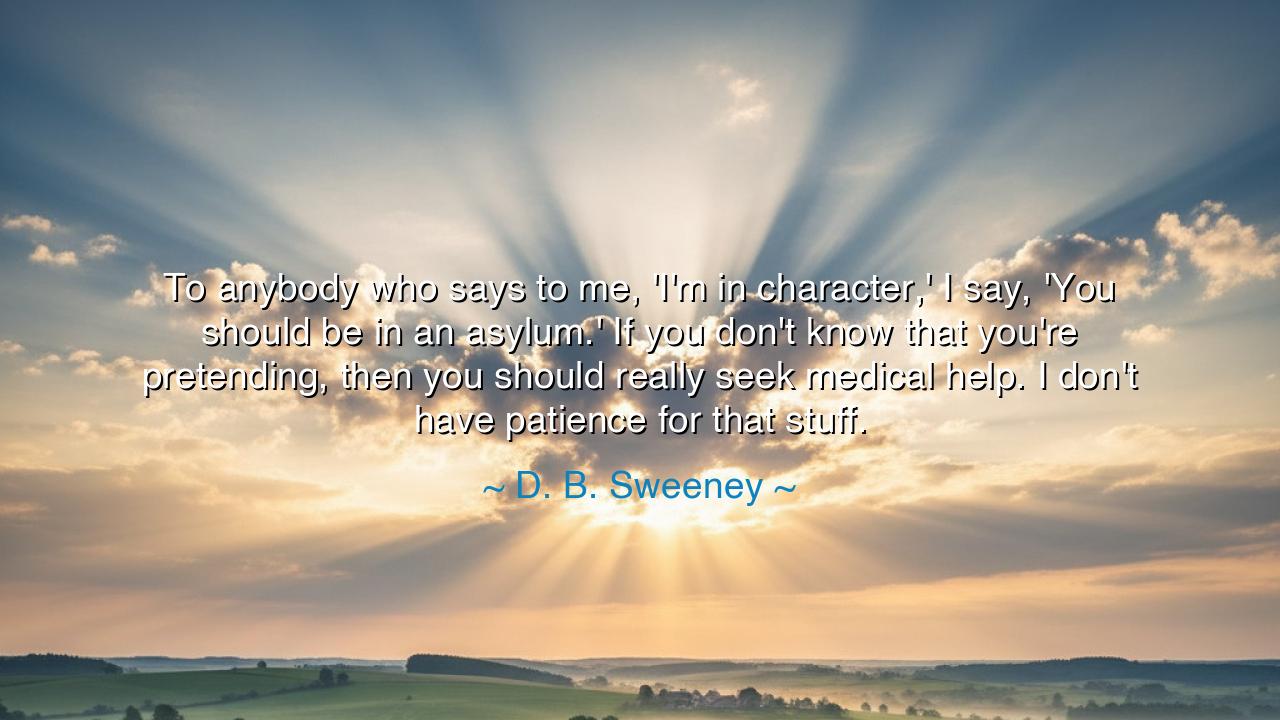
To anybody who says to me, 'I'm in character,' I say, 'You should
To anybody who says to me, 'I'm in character,' I say, 'You should be in an asylum.' If you don't know that you're pretending, then you should really seek medical help. I don't have patience for that stuff.






The words of D. B. Sweeney—“To anybody who says to me, ‘I’m in character,’ I say, ‘You should be in an asylum.’ If you don’t know that you’re pretending, then you should really seek medical help. I don’t have patience for that stuff.”—strike with the blunt force of a hammer upon stone. They are not the polished musings of philosophy, but the hard wisdom of one who has walked the stage and screen and seen the folly of excess. In these words lies a reminder of an eternal truth: that art is play, not madness; that the actor must master his role without becoming enslaved by it; and that the line between imagination and reality must remain firm, lest the soul lose itself in shadows.
The meaning shines clearly: to act is to pretend consciously, to borrow the emotions and gestures of another life while always remembering one’s own. To forget that one is pretending, to blur the boundary between self and role, is to enter dangerous territory, where art ceases to elevate and begins to consume. Sweeney’s scorn for those who declare themselves “in character” is not cruelty, but warning. He insists that true mastery lies not in delusion, but in control—the ability to step into a role with conviction, and to step out with clarity.
The ancients understood this principle well. In the theaters of Greece, actors donned masks to remind themselves and the audience that what was being shown was a performance, not life itself. The mask was both a symbol and a safeguard, preserving the boundary between the actor and the character. They believed that to lose oneself entirely in the mask was to invite madness, for art must be a mirror of life, not a replacement for it. Sweeney’s words echo this ancient wisdom: the actor who forgets the mask is no longer performing, but unraveling.
History gives us a sobering example in the tale of Heath Ledger, whose haunting portrayal of the Joker was said to have demanded deep immersion into darkness. While speculation surrounds his untimely passing, many have pointed to the dangers of losing oneself in a role without a clear path back. Here we see the truth of Sweeney’s warning: that to play convincingly does not require abandoning sanity, and that the boundary between performance and life must be guarded with vigilance.
The emotional weight of Sweeney’s words lies in their demand for discipline. For some, to lose themselves in a role seems like devotion to art; yet Sweeney insists it is weakness, not strength. The strong actor is not the one who forgets himself, but the one who remembers himself always, even in the storm of emotion, even when his voice trembles with passion or his eyes burn with fury. This is the discipline of the warrior who trains with weapons yet knows they are tools, not his soul; of the sailor who rides the storm but does not mistake the sea for his home.
The lesson for us reaches beyond the stage. In life itself, we play roles: the role of parent, of worker, of citizen, of friend. If we forget that these are roles we inhabit, guided by duty and circumstance, we risk mistaking them for our true essence. Just as the actor must remember he is pretending, so must we remember that no single role defines us completely. We are more than our work, more than our public image, more than the masks we wear. To forget this is to risk our sanity, our peace, and our freedom.
Practical wisdom follows: embrace your roles, but never lose yourself in them. If you act, act fully; if you work, work diligently; if you serve, serve wholeheartedly. But always step back and remember who you are when the mask is removed, when the curtain falls, when the day ends. In doing so, you preserve your strength, your balance, and your humanity.
Thus, Sweeney’s words, though sharp and unyielding, carry a timeless teaching: to act without delusion, to labor without losing oneself, to live with clarity between role and reality. Let this be passed to all who seek greatness: that art requires mastery, not madness; that life requires balance, not obsession. For the one who remembers who he is, even while pretending, remains forever free.






AAdministratorAdministrator
Welcome, honored guests. Please leave a comment, we will respond soon